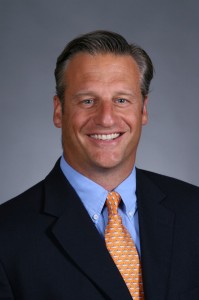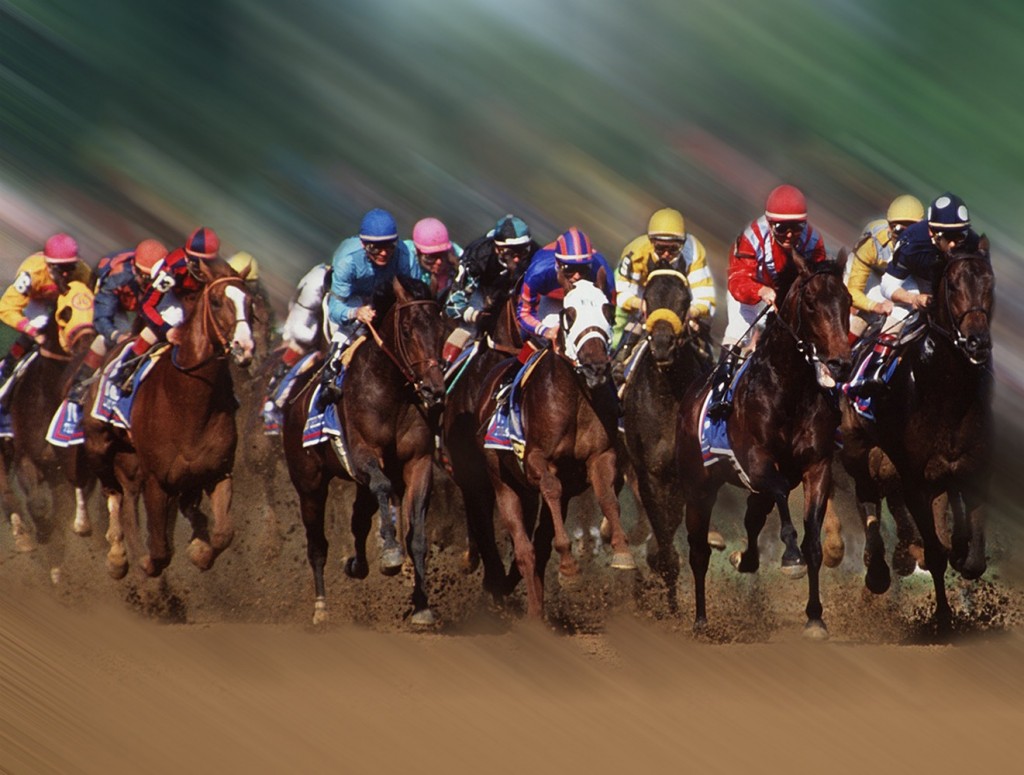Forde on the majestic Derby
ESPN.com national columnist Pat Forde, perhaps best-known for covering college football and basketball, is covering his 24th consecutive Kentucky Derby on Saturday.
Forde is a longtime Louisville resident who previously worked for 17 years at The Louisville Courier-Journal, where he won 16 APSE national awards and was nominated for the Pulitzer Prize in 1990.
Forde reflects with Front Row on Derbys past and present.
FR: Do you report on other horse racing events or attend any as a fan?
Forde: I cover the Kentucky Derby every year. I usually report on the Triple Crown races — the Kentucky Derby, Preakness and Belmont — but that varies from year to year, based on the news value of the second and third legs. And I attend plenty of races as a fan. Living in Louisville, it’s great to have Churchill Downs nearby. In fact, I was a small-time member of a small-time thoroughbred ownership syndicate from 2007-2010. That was a lot of fun. Even winning a cheap race with a cheap horse felt like winning the Kentucky Derby.
FR: Did you attend your first Derby as a journalist or a fan? Did you petition to cover it the first time or was it assigned?
Forde: I attended my first Derby in 1988 as a journalist. I was in my first year working for The Courier-Journal in Louisville and was assigned. Everyone in the sports department works the Derby. It’s a huge deal and the paper covers it impressively every year.
FR: What are the similarities and differences between covering college sports and horse racing (besides the obvious of horse versus people)?
Forde: The biggest similarity is that there tends to be a great deal of emotion and drama and fan investment in the competition. The big races and the big games pack a payload that you can feel — an electricity, a tension, a sense of gravity. I think that comes from the size of the crowds — there will be 150,000 people at Churchill Downs Saturday, much more than any football stadium can hold, and when the horses come on the track before the race the roar of the crowd will make your neck tingle.
The differences are pretty stark: Media access is much less structured, rigid and controlled in racing than it is in college sports. Generally speaking, you walk up to a trainer’s barn in the morning and just wait for him to come out when he’s ready, and you talk. There aren’t many media relations directors or scheduled news conferences, though you see more of those now than in years past. Jockeys tend to be some of the least-guarded people you will ever interview, which is enjoyable as well. Make no mistake, there is plenty of spin in both sports, but it’s diametrically opposite — in racing, the trainers and jockeys always brag on their horses and how well they’re doing heading up to a race, even if it’s not true, whereas in football or basketball there is often a concerted effort to poormouth one’s own team and build up the opponent. I guess that’s because horses can’t read bulletin board material.
FR: What’s it like covering the Derby? Can you describe the scene for someone who’s never been there?
Forde: It’s the most intense sporting event of the year, every year. I rarely get nervous on the job, but I’m always nervous at the start of the Derby. Why? Because it is so compacted — it lasts two minutes. There is precious little room for error in a two-minute sporting event — a single bad decision by the jockey, and your hopes are probably done. Some bad racing luck, and you’re toast. A stumble out of the gate, and you’re through. In football and basketball, you have 60 or 40 minutes — plenty of time for mistakes that can be overcome. Not so in the Derby. And it is a once-in-a-lifetime moment for these horses. They only run one Derby, at age 3.
The other tense aspect of the race is the concern for safety. This is the biggest field of the year, every year — 20 horses, all thundering into the first turn together with a lot on the line. I always hold my breath waiting for them to clear the first turn safely.
FR: How does this rank among the many great sports events you have covered?
Forde: It’s near the top. My first loves are still football and basketball, and covering the Final Four and major bowl games is a thrill that’s hard to beat. But I always watch the Derby from trackside on the homestretch, and the anticipation and tension that comes with the start of the Derby is unparalleled. And then it’s over so fast, you’re usually left with a pounding heart, wondering what exactly just transpired. It generally takes a minute or two after the race to regroup and go do the job.
FR: As a Louisville resident and someone who has been to 23 Derbys, what is the one secret most people wouldn’t know about it?
Forde: Tickets are really, really, really, really hard to get for a decent price. You can pay 50 dollars and get into the infield, but if you want a seat where you can actually see what’s going on, be prepared to pay. And be prepared to wait while the market floats up and down. I’ve helped some people get tickets over the years, and it’s a maddening process. However, every friend I’ve had come in for the Derby has come back at least one more time. It’s worth the expense and aggravation.
FR: We know fans get dressed up to attend the Derby. What about the sportswriters and media who cover it?
Forde: We are an infamously unfashionable bunch, but you usually see a lot of finery in the press box on Derby Day. There are more suits, dresses and hats there than at 20 Final Fours combined. Most of the writers get into the spirit of the event and dress well — as well as they can, at least. My Derby purchase this year was a pair of blue suede shoes.
FR: Can you preview this year’s Derby and a few of the horses to watch?
Forde: This is the most wide-open Derby I’ve ever seen. It’s really an undistinguished — and indistinguishable — crop of horses. Every single horse has at least one major question mark coming into this race. Most experts said that makes the workouts in the weeks leading to the race very important in terms of searching for clues on who will run big.
Given that, I’m prepared to throw out the two likely favorites — Dialed In and Uncle Mo — and look for longer shots. As of today, I’ll pick Archarcharch to win, Shackleford for place and Twice the Appeal (Calvin Borel’s horse) for show. Also trying to figure out what to do with Mucho Macho Man.








